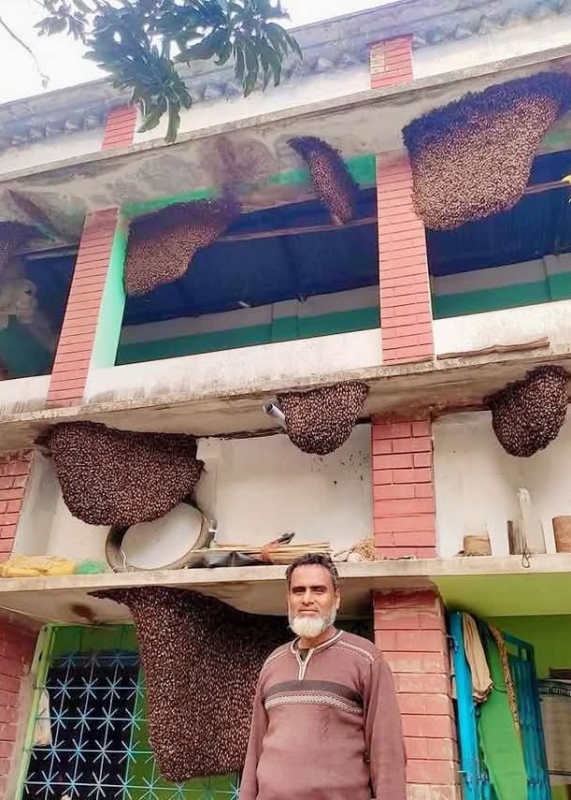- Irregularities, injustice will no longer be accepted in politics: Jamaat Ameer |
- 2 arrested in Jhenaidah for allegedly selling madrasa student |
- Koko’s wife campaigns for Tarique in Dhaka-17 |
- Bangladeshi Expats Cast 4.58 Lakh Postal Votes |
- IMF Forecasts Bangladesh GDP to Rebound to 4.7% in FY26 |
Where humans and bees live in the same house

The same building houses bee hives and humans.
Jashore, Feb 02 – In a small village in Jashore’s Monirampur, a house has earned an unusual recognition—it is known as the "Bee House."
Owned by Alamgir Hossain, the house is home not just to his family but also to thousands of bees that have built their hives in and around the property.
Surrounded by buzzing swarms, the house in Sheikhpara Khanpur village, Khanpur union, hosts at least 23 large beehives around its balcony and walls. The bees reside there for eight months each year, drawing curious visitors who come to witness this extraordinary coexistence.
"The bees arrive at a fixed time every year, usually around November, and stay until June. Then, one day, they all leave suddenly. We feel sad when they go, but we eagerly wait for their return," said Alamgir.
He recalled that it all began six years ago when seven to eight bee hives suddenly appeared in different parts at his home. Over the years, their numbers have increased, and now, more than 23 colonies of bee reside there seasonally. "They are part of our family now," he added.
Despite initial fears, the family has grown accustomed to their buzzing companions. Alamgir’s father spends a lot of time ensuring the bees remain undisturbed, while his mother, wife, and children have also learned to care for them.
"At first, we were scared of being stung, but the bees have never attacked us. They seem to recognise us as part of their environment," said Alamgir’s aunt, Achia Khatun.
Alamgir also collects honey twice during the eight-month period the bees stay, earning around Tk 50,000 annually from the sale of honey.
According to Monirampur Upazila Agriculture Officer Mahmuda Akter said, "These variants of bees are native to the Sundarbans and choose nesting sites where they feel safe, have access to food, and find a suitable habitat. They also leave traces when they migrate, helping them return to the same place year after year."
For Alamgir and his family, the bees are more than just seasonal guests—they are a part of their lives.
As they wait for their return each year, they continue to cherish the unique bond they have formed with nature’s tiny creature. - UNB

